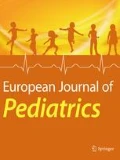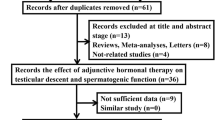Abstract
Hormonal treatment for unilateral undescended testes continues to be recommended in some countries. We reviewed the literature in favor and against this recommendation. Since the paternity rate of men with a history of unilateral undescended testes only treated with surgery is normal, the effectiveness of hormonal treatment to produce testicular descent is low, the cost is considerable, and there are potential adverse effects, hormonal treatment for boys with unilateral undescended testes should no longer be recommended.
Similar content being viewed by others
References
Atkinson PM (1975) A follow-up study of surgically treated cryptorchid patients. J Pediatr Surg 10:115–119
Barthold JS (2008) Undescended testis: current theories of etiology. Curr Opin Urol 18(4):395–400
Barthold JS, Manson J, Regan V, Si X, Hassink SG, Coughlin MT, Lee PA (2004) Reproductive hormone levels in infants with cryptorchidism during postnatal activation of the pituitary-testicular axis. J Urol 172:1736–1741
Biers SM, Malone PS (2010) A critical appraisal of the evidence for improved fertility indices in undescended testes after gonadotrophin-releasing hormone therapy and orchidopexy. J Pediatr Urol 6:239–246
Borgward TG (2004) Bernhard Schapiro (1888-1966): Talmudic scholar-andrologist-pioneer of hormonal Treatment for cryptorchidism. Wurzbg Medizinhist Mitt 23:393–411
Callaghan P (2000) Undescended testis. Pediatr Rev 21:395
CendronM KMA, Huff DS, Koop CE, Snyder HM 3rd, Duckett JW (1989) Cryptorchidism, orchiopexy and infertility: a critical long-term retrospective analysis. J Urol 142:559–562
Cooper TG, Noonan E, von Eckardstein S, Auger J, Baker HW, Behre HM, Haugen TB, Kruger T, Wang C, Mbizvo MT, Vogelsong KM (2010) World Health Organization reference values for human semen characteristics. Hum Reprod Update 16:231–245
Cortes D, Thorup J, Lindenberg S, Visfeldt J (2003) Infertility despite surgery for cryptorchidism in childhood can be classified by patients with normal or elevated follicle-stimulating hormone and identified at orchidopexy. BJU Int 91:670–674
Cortes D, Thorup J, Visfeldt J (2000) Hormonal treatment may harm the germ cells in 1 to 3-year-old boys with cryptorchidism. J Urol 163:1290–1292
Cortes D, Thorup JM, Visfeldt J (2001) Cryptorchidism: aspects of fertility and neoplasms. A study including data of 1335 consecutive boys who underwent testicular biopsy simultaneously with surgery for cryptorchidism. Horm Res 55:21–27
De Muinck Keizer-Schrama SM, Hazebroek FW, Drop SL, Degenhart HJ, Molenaar JC, Visser HK (1988) Hormonal evaluation of boys born with undescended testes during their first year of life. J Clin Endocrinol Metab 66:159–164
Demirbilek S, Atayurt HF, Celik N, Aydin G (1997) Does treatment with human chorionic gonadotropin induce reversible changes in undescended testes in boys? Pediatr Surg Int 12:591–594
Dunkel L, Taskinen S, Hovatta O, Tilly JL, Wikström S (1997) Germ cell apoptosis after treatment of cryptorchidism with human chorionic gonadotropin is associated with impaired reproductive function in the adult. J Clin Invest 100:2341–2346
Fallon B, Kennedy TJ (1985) Long-term follow-up of fertility in cryptorchid patients. Urology 25:502–504
Fanconi S, Reinberg O, Gapany G, Meyrat BJ, Frey F, Vaudaux B, Di Bernardo S, Boulos T, Sekarski S, Spehrs-Ciaffi V, Jeannet PY (2008) Pediatrics. Rev Med Suisse 4:61–66
Forest MG, Sizonenko PC, Cathiard AM, Bertrand J (1974) Hypophyso-gonadal function in humans during the first year of life. 1. Evidence for testicular activity in early infancy. J Clin Invest 53:819–828
Hadziselimovic F, Emmons LR, Buser MW (2004) A diminished postnatal surge of Ad spermatogonia in cryptorchid infants is additional evidence for hypogonadotropic hypogonadism. Swiss Med Wkly 134:381–384
Hadziselimovic F, Herzog B (2001) Importance of early postnatal germ cell maturation for fertility of cryptorchid males. Horm Res 55:6–10
Hadziselimovic F, Hocht B, Herzog B, Buser MW (2007) Infertility in cryptorchidism is linked to the stage of germ cell development at orchidopexy. Horm Res 68:46–52
Jallouli M, Rebai T, Abid N, Bendhaou M, Kassis M, Mhiri R (2009) Neoadjuvant gonadotropin-releasing hormone therapy before surgery and effect on fertility index in unilateral undescended testes: a prospective randomized trial. Urology 73:1251–1254
Job JC, Toublanc JE, Chaussain JL, Gendrel D, Roger M, Canlorbe P (1987) The pituitary-gonadal axis in cryptorchid infants and children. Eur J Pediatr 146:S2–S5
Kollin C, Karpe B, Hesser U, Granholm T, Ritzén EM (2007) Surgical treatment of unilaterally undescended testes: testicular growth after randomization to orchiopexy at age 9 months or 3 years. J Urol 178:1589–1593
Lala R, Matarazzo P, Chiabotto P, de Sanctis C, Canavese F, Hadziselimovic F (1993) Combined therapy with Lhrh and Hcg in cryptorchid infants. Eur J Pediatr 152:S31–S33
Lee PA, O'Leary LA, Songer NJ, Coughlin MT, Bellinger MF, LaPorte RE (1996) Paternity after unilateral cryptorchidism: a controlled study. Pediatrics 98:676–679
Lee PA, Coughlin MT (2002) The single testis: paternity after presentation as unilateral cryptorchidism. J Urol 168:1680–1682
Lee PA, Coughlin MT, Bellinger MF (2000) Paternity and hormone levels after unilateral cryptorchidism: association with pretreatment testicular location. J Urol 164:1697–1701
Marchetti F, Bua J, Tornese G, Piras G, Toffol G, Ronfani L, Italian Study Group on Undescended Testes ISGUT (2012) Management of cryptorchidism: a survey of clinical practice in Italy. BMC Pediatr 12(1):4
Mathers MJ, Sperling H, Rübben H, Roth S (2009) Hodenhochstand: diagnostik, therapie und langfristige konsequenzen. Dtsch Arztebl Int 106:527–532
Miller KD, Coughlin MT, Lee PA (2001) Fertility after unilateral cryptorchidism. Paternity, time to conception, pretreatment testicular location and size, hormone and sperm parameters. Horm Res 55:249–253
Niederberger C, Joyce GF, Wise M, Meacham RB (2007) Male infertility. In: MS Litwin, CS Saigal (eds) Urologic diseases in America. US Department of Health and Human Services, Public Health Service, National Institutes of Health, National Institute of Diabetes and Digestive and Kidney Diseases. US Government Printing Office, Washington, DC, NIH Publication No. 07-5512, 2007, pp 461-481
Paasch U, Thieme C, Grunewald S, Glander HJ (2004) Electronic data base systems support the evaluation of male infertility factors, example cryptorchidism. Urol Int 72:154–161
Pettersson A, Richiardi L, Nordenskjold A, Kaijser M, Akre O (2007) Age at surgery for undescended testis and risk of testicular cancer. N Engl J Med 356:1835–1841
Pyörälä S, Huttunen NP, Uhari M (1995) A review and meta-analysis of hormonal treatment of cryptorchidism. J Clin Endocrinol Metab 80:2795–2799
Raivio T, Toppar J, Kaleva M, Virtanen H, Haavisto AM, Dunke L, Jänne OA (2003) Serum androgen bioactivity in cryptorchid and noncryptorchid boys during the postnatal reproductive hormone surge. J Clin Endocrinol Metab 88:2597–2599
Retief PJ (1977) Fertility in undescended testes. S Afr Med J 52:610–613
Ritzén EM, Bergh A, Bjerknes R, Christiansen P, Cortes D, Haugen SE, Jörgensen N, Kollin C, Lindah lS, Lackgren G, Main KM, Nordenskjöld A, Rajpert-De Meyts E, Söder O, Taskinen S, Thorsson A, Thorup J, Toppari J, Virtanen H (2007) Nordic consensus on treatment of undescended testes. Acta Paediatr 96:638–643
Schwentner C, Oswald J, Kreczy A, Lunacek A, Bartsch B, Deibl M, Radmayr C (2005) Neoadjuvant gonadotropin-releasing hormone therapy before surgery may improve the fertility index in undescended testes: a prospective randomized trial. J Urol 173:974–977
Suomi AM, Main KM, Kaleva M, Schmidt IM, Chellakooty M, Virtanen HE, Boisen KA, Damgaard IN, Kai CM, Skakkebaek NE, Toppari J (2006) Hormonal changes in 3-month-old cryptorchid boys. J Clin Endocrinol Metab 91:953–958
Thorsson AV, Christiansen P, Ritzén M (2007) Efficacy and safety of hormonal treatment of cryptorchidism: current state of the art. Acta Paediatr 96:628–630
Virtanen HE, Toppari J (2008) Epidemiology and pathogenesis of cryptorchidism. Hum Reprod Updat 14:49–58
Conflict of interest
The authors declare no conflict of interest.
Author information
Authors and Affiliations
Corresponding author
Rights and permissions
About this article
Cite this article
Ludwikowski, B., González, R. The controversy regarding the need for hormonal treatment in boys with unilateral cryptorchidism goes on: a review of the literature. Eur J Pediatr 172, 5–8 (2013). https://doi.org/10.1007/s00431-012-1711-y
Received:
Accepted:
Published:
Issue Date:
DOI: https://doi.org/10.1007/s00431-012-1711-y




